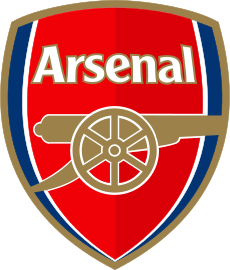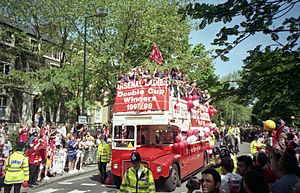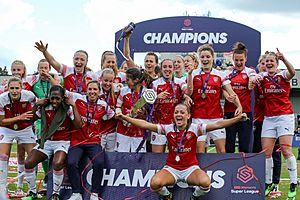Arsenal W.F.C. facts for kids
 |
||||
| Full name | Arsenal Women Football Club | |||
|---|---|---|---|---|
| Nickname(s) | The Gunners | |||
| Founded | 1987 as Arsenal Ladies | |||
| Ground | Emirates Stadium (from 2024–25 season) Meadow Park (select competition games) |
|||
| Capacity | 60,704 (all seated) Emirates Stadium 4,500 (1,700 seated) Meadow Park |
|||
| Owner | Kroenke Sports & Entertainment | |||
| Manager | Renée Slegers | |||
| League | FA WSL | |||
| 2019–20 | FA WSL, 3rd of 12 | |||
|
||||
Arsenal Women Football Club, often called just Arsenal, is a professional women's football team. They are based in Islington, London, England. The club plays in the Women's Super League. This is the top football league for women in England.
Arsenal Women started in 1987. Vic Akers helped create the team and became their first manager. He was also their longest-serving and most successful manager. He led Arsenal to many wins until he left in 2009. The team won the most top-tier matches in English football history. They also hold records for winning the most "doubles" (two major trophies in one season) and "trebles" (three major trophies in one season). Arsenal has finished seven league seasons without losing a single game. They also set records for the longest unbeaten run, most goals scored, and most points won.
Arsenal is the most successful club in English women's football. They are also one of the most successful women's clubs in the world. They have won the most titles in every major competition they have played in England. This includes 15 league titles, 14 Women's FA Cups, and 7 Women's League Cups. They have also won 10 Women's National League Cups and 5 Women's FA Community Shields.
Arsenal is the only English club to win the UEFA Women's Champions League. They won it in 2007 and again in 2025. They are also the only English club to win a "continental treble." This means winning their league, a main domestic cup, and the Champions League all in the same season. In the 2006–07 season, they even won six trophies, which is called a "sextuple."
Arsenal plays most of their home games at the Emirates Stadium. Some games are also played at Meadow Park in Borehamwood. In the 2023–24 season, Arsenal broke the WSL attendance record three times.
On June 10, 2025, the club announced that the Emirates Stadium would host all 11 Women's Super League home matches for the 2025–26 season. They also plan for UEFA Women's Champions League knockout games to be played at the Emirates.
Contents
Club History: How Arsenal Women Started
1987–2009: Early Days and Big Wins
Arsenal Football Club thought about having a women's team as early as the 1960s. Local women's teams asked for help to become professional. But Arsenal's leaders said no in 1965. The The Football Association (FA) lifted its ban on women's football in England in 1969. After that, the sport became more popular. New leagues and cup competitions were started by the Women's Football Association (WFA).
Millwall Lionesses was the first women's team to join a big men's club. They started in 1971 and had a great youth program for young women. Millwall F.C. supported them. Arsenal wanted to do the same. They started their own women's team and youth programs for girls. They joined with a local team called Aylesbury Ladies.
Arsenal Ladies Football Club was formed in 1987. Vic Akers, who was the kit manager for the men's team, started it. He became the first manager of the amateur team. With help from David Dein, the club's vice chairman, Akers got resources like boots, the men's team bus, and training fields. At that time, women's football didn't get much money. Because of this support, Arsenal became very strong in English women's football in the 1990s and 2000s.
They won their first big trophy, the Women's League Cup, in the 1991–92 season. They also moved up to the FA Women's Premier League that same year. A season later, they won the top league title right away.
This started a long period of success for the club. They moved permanently to Meadow Park in Borehamwood, Hertfordshire. They shared the stadium with Boreham Wood, a non-league team. Arsenal worked hard to make women's football just as important as men's football. For 20 years, Arsenal focused on training, tactics, finding new players, and money. Their goal was to grow the club and win trophies.
Throughout the 1990s and 2000s, Arsenal was often at the top of the Premier League. They had talented players who grew up in their own academy, like Marieanne Spacey and Faye White. They also spent money to bring in star players like Emma Byrne. This helped them win many trophies. Akers stepped down as manager in 1997 to work with the men's team. Terry Howard took over for the 1997–98 season. But Akers returned in 1998–99 after Howard left. The club became semi-professional in 2002.
Under Akers, Arsenal won many titles in England. They won 11 league titles, 9 FA Women's Cups, 10 FA Women's Premier League Cups, and 5 FA Women's Community Shields. This included winning the league seven times in a row from 2003–04 to 2009–10. They also had six seasons where they didn't lose a single game.
Akers led the team to their most successful season ever in 2006–07. They won every competition they played in, including the UEFA Women's Cup. This was Arsenal's only European trophy at the time. It was also the first time an English club had won that competition. This amazing achievement of winning six trophies was recognized with an award from the Sports Journalists' Association.
Akers also helped the team set many English women's football records. They had a six-year unbeaten run in the league from October 2003 to March 2009. This was 108 games without a loss! During that time, Arsenal won a record 51 league games in a row. This happened between November 2005 and April 2008. Akers retired from managing after winning three domestic trophies in the 2008–09 season.
2009–Present: New League and More Success
Tony Gervaise took over from Akers. But he resigned in February 2010 after only eight months. He felt his role was being interfered with. In a surprising move, Laura Harvey, the reserve team coach, became the first-team manager. Gervaise became the reserve coach. Harvey was the club's first female coach.
After a year break to prepare for a new league, Arsenal became a founding member of the FA Women's Super League. This new league started in spring 2011. Arsenal won the first season, which was their eighth English title in a row. They also won the FA Cup, completing another "domestic double."
After two years without a league win, Shelley Kerr became Harvey's replacement in 2013. Under her, the club won two FA Women's Cups. One win was in 2014, just two weeks after the men's team won their FA Cup. This was a rare "FA Cup double" for the club. But after a bad start to the 2014 season, Kerr resigned. She was replaced by Pedro Losa.
Losa led the team to win the 2015 FA WSL Cup and the 2016 FA Women's Cup. He also helped rebuild the team. He brought in younger stars like Daniëlle van de Donk, Kim Little, Beth Mead, and Vivianne Miedema. He also helped young players like Leah Williamson develop. However, Losa left after a poor start to the 2017-18 season. Joe Montemurro took his place.
In July 2017, the club changed its name to Arsenal Women Football Club. This was to show "togetherness and unity" and keep the club's modern spirit. Montemurro used the strong team Losa had built. He led Arsenal to win the 2018–19 Women's Super League title with a game to spare. This was their first league title in seven years. It also meant the club returned to the Champions League after five years. Montemurro left the club at the end of the 2020–21 season.
After Montemurro resigned, Jonas Eidevall became the head coach. On September 24, 2022, a game against Tottenham Hotspur at the Emirates Stadium had 47,367 fans. This was the highest attendance ever for a WSL match at the time. Arsenal won that game 4–0. On March 5, 2023, Arsenal beat Chelsea 3–1 in the Women's League Cup final. This was their first trophy since 2019. Arsenal won the cup again the next year. They beat Chelsea 1–0 after extra time to win their ninth Women's League Cup title.
In the 2023–24 season, the WSL attendance record was broken three times at the Emirates. There were 54,115 fans against Liverpool in September. Then 59,042 against Chelsea in December. And 60,160 against Manchester United in February. In March, the Emirates Stadium was full again for the North London derby against Tottenham Hotspur. There were 60,050 fans, making it the second-biggest crowd in WSL history.
On October 15, 2024, during the 2024-25 season, Jonas Eidevall resigned as manager. This happened after some poor results and fan criticism. On the same day, it was announced that Renée Slegers, a former Dutch national player, was promoted. She became the interim head coach. On January 17, 2025, Renee Slegers was made the permanent head coach until the end of the 2025/26 season. On April 27, 2025, Arsenal reached their first UEFA Women's Champions League final in 18 years. They beat Lyon 5-3 over two games. In the final on May 24, Arsenal defeated Barcelona 1–0. This win gave them their second Champions League title.
Team Kits: What They Wear
Kit Makers and Shirt Sponsors
| Period | Kit manufacturer | Shirt sponsor (chest) | Shirt sponsor (sleeve) |
|---|---|---|---|
| 1987–1994 | Adidas | JVC | None |
| 1994–1999 | Nike | ||
| 1999–2002 | Dreamcast Sega |
||
| 2002–2006 | O2 | ||
| 2006–2014 | Fly Emirates | ||
| 2014–2018 | Puma | ||
| 2018–2019 | Visit Rwanda | ||
| 2019– | Adidas |
Where Arsenal Women Play: Their Stadiums
Arsenal played most of their home games at Meadow Park. This is the home of National League team Boreham Wood FC. It is in Borehamwood, Hertfordshire. The stadium can hold 4,500 people.
In the 2022–23 season, Arsenal had the highest home attendance in the WSL. An average of 15,046 fans came to each match. This average included games played at both Meadow Park and Emirates Stadium.
During the 2023–24 season, Arsenal played five matches at the Emirates Stadium. The rest were at Meadow Park. The average attendance for all home games was 30,017 fans.
For the 2024–25 season, Emirates Stadium became Arsenal's main home. The team played 9 WSL matches and Champions League 2024–25 matches at the Emirates. Other matches were played at Meadow Park. One Champions League group stage match was moved to Meadow Park because the men's team had a game at the Emirates.
In June 2025, Arsenal Women announced a big change. All 11 of their Women's Super League (WSL) home games for the 2025–26 season will be played at the Emirates Stadium. This stadium can hold 60,704 people. This will be the club's first full WSL season playing all home games there. Games in the UEFA Women's Champions League group stage and domestic cup competitions will still be at Meadow Park. However, Champions League knockout games will also be at the Emirates if the team qualifies.
Meet the Players: Arsenal Women's Squad
First-Team Squad
|
|
Academy Players
Arsenal also has a reserve team. This team is mostly made up of players from their Academy. The reserves have won four FA Women's Premier Reserve League titles. They also won five FA Women's Premier Reserve League Cups.
|
Famous Former Players
For notable current and former players, see Category:Arsenal W.F.C. players.
Who Runs the Team: Management and Staff
Current Staff
- As of January 17, 2025
| Position | Name |
|---|---|
| Director of Women's Football | Clare Wheatley |
| Technical Services Manager | Jodie Taylor |
| Manager | Renée Slegers |
| Assistant coaches | Aaron D'Antino |
| Kelly Smith | |
| Chris Bradley | |
| Goalkeeper coach | Sebastian Barton |
| Lead strength and conditioning coach | Padraig Roche |
| Head of sports medicine and sports science | Gary Lewin |
| Doctor | Matthew Ogunsanya |
| Lead physiotherapist | Rose Glendinning |
| Sports psychologist | Matt Domville |
| Analyst | Jonny Dixon |
| Melissa Phillips | |
| Head of Women's Football Operations | Holly Skinner |
| Academy manager | James Honeyman |
Team Managers Through the Years
Trophies and Achievements: Arsenal Women's Honours
| Type | Competition | Titles | Seasons |
|---|---|---|---|
| Regional | London County FA Women's Cup | 10 | 1994–95, 1995–96, 1996–97, 1999–2000, 2003–04, 2006–07, 2007–08, 2008–09, 2009–10, 2010–11 |
| National | English Football Championship | 15 | 1992–93, 1994–95, 1996–97, 2000–01, 2001–02, 2003–04, 2004–05, 2005–06, 2006–07, 2007–08, 2008–09, 2009–10, 2011, 2012, 2018–19 |
| FA Women's Premier League South | 1 | 1991–92 | |
| Women's FA Cup | 14 | 1992–93, 1994–95, 1997–98, 1998–99, 2000–01, 2003–04, 2005–06, 2006–07, 2007–08, 2008–09, 2010–11, 2012–13, 2013–14, 2015–16 | |
| FA Women's League Cup | 7 | 2011, 2012, 2013, 2015, 2017–18, 2022–23, 2023–24 | |
| FA Women's National League Cup | 10 | 1991–92, 1992–93, 1993–94, 1997–98, 1998–99, 1999–2000, 2000–01, 2004–05, 2006–07, 2008–09 | |
| Women's FA Community Shield | 5 | 2000, 2001, 2005, 2006, 2008 | |
| Continental | UEFA Women's Champions League | 2 | 2006–07, 2024–25 |
See also
 In Spanish: Arsenal Women Football Club para niños
In Spanish: Arsenal Women Football Club para niños
 | Sharif Bey |
 | Hale Woodruff |
 | Richmond Barthé |
 | Purvis Young |



